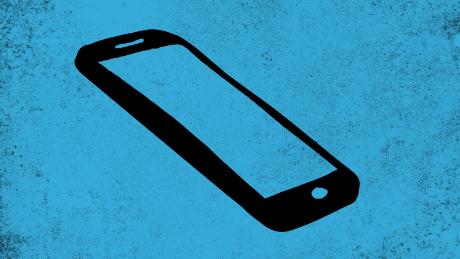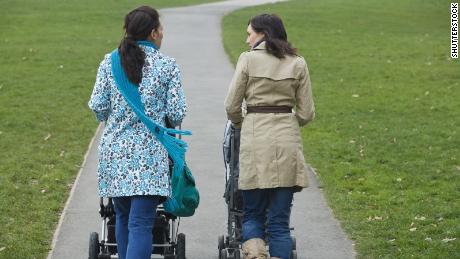Am I a Bad Parent? is a CNN Parenting parenthood advice column. Send us your confidential questions about any worrisome parenting behaviors you're having, and we'll help you work through the problem -- and the guilt.
(CNN)I often feel guilty that I spend too much time on my phone when I'm with my kids, and I feel that there is a lot of "shaming" of moms for this in the media and elsewhere. But is it really that harmful for them?
My kids get way more attention from me than I ever got from my own parents. My mom was loving and kind, and I never felt neglected, but she almost never played with me and was usually distracted by cooking/cleaning/watching television, etc. She also spent a lot of time on the phone, chatting to friends for hours while I did my own thing.
I play with my kids at least an hour every day, read to them, do art projects with them, take them places and so on. But I often check my email or the news or Facebook or whatever on my phone when I'm with them or at the park -- mainly because child care is exhausting and I need a break. Is this really so bad?
Signed,
Need My Screen Time
Dear Need My Screen Time,
You may be familiar with the many ways cell phones can disrupt family life. It's "contaminated time," they call it, when our kids need us but we aren't really present. The phrase conveys that the purity of the parent-child bond has been compromised. But the degree of the toxicity, and the threat it poses, remain an agita-producing mystery.
You're probably also familiar with the other pervasive critique of contemporary parents, which is that we're overdoing it. They call us helicopters, lawnmowers -- I predict "wheelbarrows" is coming next to describe parents who direct their children's every move -- and tell us to take two steps away from our children lest we stifle them.
So the options seem to be either contaminate or stifle. And we wonder why parents today are so anxious. Somewhere in between these two options must exist a state in which a child feels neither neglected nor overwhelmed. And in that state, I'd like to believe, a parent can occasionally space out with the help of their phone.
The fact that you sent me a question signifies that you are the kind of parent who cares enough to seek out advice about a potential problem. And that means, I suspect, that your kids are doing just fine.
It's you I'm worried about. Instead of looking at how your phone time affects your kids, I want to consider how it is affecting you. How does that tiny and yet infinite computer in your pocket affect your experience of parenting?
You deserve a break sometimes. That's a given. It's using the cell phone for the break that makes it tricky.
Let's return to your non-helicopter mom for a minute. Her landline was like a calm lake, in which a single ripple could be easily observed. Call. Chat. Hang up. The cell phone, by contrast, is a wide-open sea in which there are many directions one could travel and impassible tides, pings and texts and news alerts, that have a whole other set of destinations in mind.
The potential and efficiency of cell phones can be a godsend for parents. We can take care of a problem at work, order groceries, read the news and comment on a friend's baby pictures, all while our children play at the park or throw Legos around the living room. But the cell phone's neverending-ness, and the attendant addictiveness, can also easily raise our anxiety.
Questions to ask yourself: Is it easy to put down the phone? Do you feel satisfied when you do? Or does a phone session tend to flood you with thoughts about everything else you should be doing (besides parenting) and everything else everyone else is doing (besides parenting)? What is the transition from phone back to parenting like?
Because few of us want to -- or can -- totally disconnect from the digital realm while parenting, I am not going to contemplate the idea of going cold turkey. Instead, let's look at how to use cell phones in a way that minimizes potential damage to parent and child. We'll skip the obvious rules, like no cell phone use while driving or comforting a sobbing child, and jump right to issues you might have overlooked.
Catherine Steiner-Adair, clinical psychologist, school consultant and co-author of "The Big Disconnect: Protecting Childhood and Family Relationships in the Digital Age," told me that, based on her research, children are particularly sensitive to parental cell phone use in moments of transition during the day.
School dropoff, school pickup or any other time you are saying hello or goodbye are when children most want their parents' undivided attention. This means no work calls on the way to school, either. "These moments are emotionally pivotal for children and more loaded than other moments," she said.
Steiner-Adair has no problem with parents being on their cell phones in the presence of their children or while the children are playing by themselves or with another. But she does want the parent to make it clear to the children that they are still available, even if they are on their cell phone. If, or when, a child requests your attention, put down the phone.
What if you're in the middle of fixing a work problem and your child isn't in a state of distress? Steiner-Adair says it's fine to wrap it up, as long as you explain to your kid that you need a few more minutes.
And then really take only a few more minutes. Cell phones mess with our sense of time and can even cause our hearing to fade, which makes us less aware of our surroundings. They're also stimulants that tend to rev us up, which can make it difficult to adjust back to the plodding pace of parenting young children. "Just having your phone on your body, even if it is turned off, is distracting and causes anxiety," Steiner-Adair said, adding that phoneless parenting is often happier parenting.
Maryam Abdullah, a developmental psychologist and parenting program director at the Greater Good Science Center, said that being "intentional" with phone use can help ease some of the anxiety they create in parents. She recommends that you commit to some rough schedule of when you will and won't look at your phone. "This way, you are reaffirming to yourself that you have permission to use it during certain times, when you know that it isn't going to be a problem." These limits don't only help you avoid being on the phone during less-than-ideal moments, they also help you feel in control when you are.
Join the conversation on CNN Parenting's Facebook page
See the latest news and share your comments with CNN Parenting on Facebook.
So, where to draw the line? There's no universal prescription. I suggest paying close attention to your moods, your needs, your daily rhythms, and you will probably get a good sense of it. Would you be a better parent if you put your cell phone down more, less distracted by the internal and external noise digital life tends to generate? Or would you be a worse one, lonely and isolated? Where might the sweet spot exist for you?
Take all that energy you are wasting feeling guilty about cell phone use and put it toward trying to answer these questions. Your whole family will benefit from the clarity of mind and sense of peace that will come from figuring this out.








